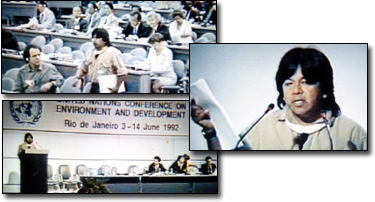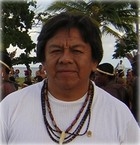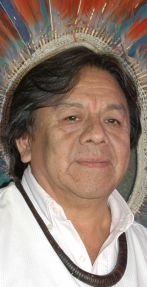 |
| Marcos Terena, Brazil (http://www.dialoguebetweennations.com/IR/english/KariOcaKimberley/KO_UNCED.html) |
"We came here to fight for life. We came here to fight for our life, for our survival, but also for the survival of the planet, and the planet is just like a big canoe, a big boat, where we have blacks, Indians, whites. Because, when your lungs fail, can no longer breathe this air, your bodies will be sick and so will ours. And when we no longer have any water to drink, when you can no longer quench your thirst with the water from rivers, when you can no longer have forests, what are you going to do? You many invent some kind of pill to quench your thirst, but this will never taste as good as the fresh waters that we drink in our forests." - Marcos Terena (1992)At the United Nations Conference on Environment and Development, (UNCED) Marcos Terena member of The Call of the Earth Steering Committee, presented the KARI-OCA Declaration in 1992.
 |
| Marcos Terena (http://www.earthcall.org/en/) |
Marcos Terena is from the Indigenous Terena Peoples of the Pantanal region in Brazil, near the borders with Bolivia and Paraguay. He founded the first indigenous political movement in Brazil, the Union of Indigenous Nations in 1977. Marcos Terena is a national of Brazil.In 1992, he organized the World Conference of Indigenous Peoples, which was held the week before the United Nations Earth Summit. In an indigenous zone, the Kari-Oca Park Marcos coordinated over 700 indigenous leaders from around the world to create the Earth Letter and the Kari-Oca Declaration. He was chosen to deliver their 5 minute message to world leaders at the Earth Summit. The earth summit was the United Nations Conference on Environment and Development (UNCED), Rio de Janeiro, 3-14 June 1992
The purpose in the conference was to unite the indigenous people of the earth. The goal was uniting in human rights, land, culture, development and sustainability on earth. The Indigenous Peoples of Brazil, not unlike globally, are challenged by Western thinking. The indigenous people of the Amazon relied on the land.
In many regions, mineral extraction, logging, mining has caused pollution, undrinkable water, genetically modified seeds and monoculture cash crops, and the absence of fish. The new illnesses and the reduction of the land have made their traditional ways of life impossible.
Land issues are still a topic on contention. There is some legal recognition of indigenous peoples' rights to the protection and control of their lands, there is still cause for concern. Marcos Terena continues to be committed to the rights of indigenous people and the earth. He is consistent on his focus of the ecosystem and public awareness.
 |
| MarcosTerena (2007) (http://www.un.org/) |
He currently is or has been:
Marcos Terena organized the indigenous participation in at the 8th Conference of Parties to the Convention on Biological Diversity and the American Summit on Racial Equality.
Photo: http://www.un.org/dpi/ngosection/conference/MarcosTerena.htm
He has written two books:
Page created on 4/22/2008 12:00:00 AM
Last edited 4/22/2008 12:00:00 AM
